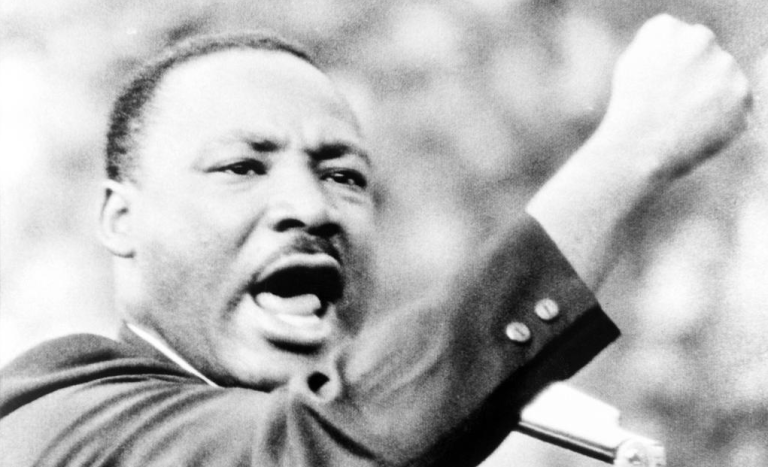Editor’s Note: As we leave January, going from the month where we celebrate the life of the Rev. Dr. Martin Luther King, Jr., into Black History Month, we have a special reflection on Dr. King’s legacy penned by one of Chicago’s own. The senior pastor of Trinity United Church of Christ, the Rev. Dr. Otis Moss III, leaves us with a crystal clear reminder: Do not de-radicalize King. This message has special significance this week as President Donald Trump delivers his first State of the Union Address. The impact that Dr. King had on this country as a justice seeker and a Christian are undeniable, but if we today merely raise hosannas to King’s name without the same courageous commitment to fighting all social ills, we are merely loud gongs and clanging symbols – especially if we do so despite the obvious presence of evil in our midst. – Rev. Dr. Linda E. Thomas, editor of “We Talk. We Listen”
Once again, as a nation, we stand on the precipice of contradiction and conflict.
This month, across the nation, in various communities, and across the city of Chicago, organizations attempted to celebrate the legacy of Dr. Martin Luther King, Jr., and the freedom struggle, called by some the Civil Rights Movement. I use the term “attempted” because most celebrations will de-radicalize Dr. King, into a feel-good rhetorical eunuch who offers no challenge to America’s open wound of racial animus and the brutality of poverty. Dr. King’s name will flow from the lips of infantile political pundits, who offer horrific myths about “manure-‐holes” and ethnicity while simultaneously uttering the name of a genuine prophet and morally courageous revolutionary named Martin Luther King, Jr., who was birthed into a nation that negated his personhood.
In this moment where civic and political decency have been recaptured by Confederate ghosts who haunt the words of the president of the United States, we need to salvage the true legacy of Rev. Dr. Martin Luther King, Jr., the power of Fannie Lou Hamer , and the brilliance of Bayard Rustin. The truth of the legacy, and the impact of the above individuals, is the fact that King, Hamer, and Rustin sought to disrupt the political and economic structure of America, based on a moral vision drawn from the Abrahamic tradition and connected to the spiritual work of the anti-‐colonialism movement of India, led by Mohandas K. Gandhi.
Dr. King, a Baptist preacher, raised in the Black theological tradition of resistance, service, and commitment, set the tone — nationally — for Black Southern resistance to disable vulgar forms of blatant acts of white supremacy.
Fannie Lou Hamer, a former sharecropper-turned-activist and non-traditional teacher, came from the same theological tradition as Martin Luther King, Jr., but was raised in the web of poverty and sexism; plus the frigid actions of racism in Mississippi. Hamer became the guiding light for merging faith, gender, and class as an intersection.
Bayard Rustin, who was Quaker, gay, and a believer in the power of people organizing for change, became the organizing mentor and teacher for Dr. King and Fannie Lou Hamer throughout the movement. Each person, Black and faithful, yet raised in different circumstances dared to offer a vision, not of “making this country great again,” but stating, without equivocation:
“America cannot be a city on the hill without treating those who have been scarred by this nation’s racial glaucoma with dignity and offering a new economic and social vision for the democratic experiment we call America.”
The rhetoric of Donald Trump demonstrates a deep moral fracture and flaw in our nation. The language of privilege and undergirding tone of dismissal floats in the air of civic conversation. In times such as this, we need not celebration and commemoration of men and women who lived valiantly, but we need to be disturbed and re-energized; not by the “safe” King, created by certain persons to tone down his radical legacy, but we need the radical King, the radical Hamer, and the radical Rustin. We do not need simple slogans, but we must arm ourselves with moral courage, outrage, and a vision for a nation where the debilitating effects of poverty, racial hierarchy, and gender marginalization are actively banished from public policy and political discourse.
I am not interested in singing songs or stating what “we used to do.”
I am interested in fighting and drawing strength and lessons from the ancestors of our struggle and planning a better future for my children.
As we celebrate King this month, I hope you will do more than remember, but join the fight to resist policies that dehumanize those who are incarcerated and incarcerate families of the incarcerated. Resist words dipped in fear, designed to demonize “dreamers” — brilliant children raised in this country brought to America by parents looking for a better life.
Resist economic policies designed to cripple the poor and further enrich the wealthy.
Resist alleged “bar stool talk,” that is nothing more than vile speech, anointed by the racist demons of this world.
We need the legacy of King, the power of Hamer, the brilliance of Rustin, and most of all, we need you.

